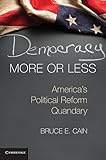Democracy More Or Less : America's Political Reform Quandary
By: Cain, Bruce E.
Publisher: Cambridge University Press 2014Description: 282, pp.ISBN: 9781107612266.Subject(s): Democracy | United States | Representative government and representation | Polarization (Social sciences) | Political participation | Political cultureDDC classification: 320.973 Summary: Why do American political reform efforts so often fail to solve the problems they intend to fix? In this book, Bruce E. Cain argues that the reasons are an unrealistic civic ideal of a fully informed and engaged citizenry and a neglect of basic pluralist principles about political intermediaries. This book traces the tension between populist and pluralist approaches as it plays out in many seemingly distinct reform topics, such as voting administration, campaign finance, excessive partisanship, redistricting, and transparency and voter participation. It explains why political primaries have promoted partisan polarization, why voting rates are declining even as election opportunities increase, and why direct democracy is not really a grassroots tool. Cain offers a reform agenda that attempts to reconcile pluralist ideals with the realities of collective-action problems and resource disparities. Offers a timely examination of the current public dismay with American government Attempts to explain the problems in jargon free, clear language that is accessible to general readers Discusses a wide range of reform topics including campaign finance reform, election administrations, conflict of interest regulation, political parties, transparency, new participation opportunities, direct democracy and corruption| Item type | Current location | Call number | Status | Date due | Barcode |
|---|---|---|---|---|---|
 Books
Books
|
NASSDOC Library | 320.973 CAI-D (Browse shelf) | Available | 51497 |
Why do American political reform efforts so often fail to solve the problems they intend to fix? In this book, Bruce E. Cain argues that the reasons are an unrealistic civic ideal of a fully informed and engaged citizenry and a neglect of basic pluralist principles about political intermediaries. This book traces the tension between populist and pluralist approaches as it plays out in many seemingly distinct reform topics, such as voting administration, campaign finance, excessive partisanship, redistricting, and transparency and voter participation. It explains why political primaries have promoted partisan polarization, why voting rates are declining even as election opportunities increase, and why direct democracy is not really a grassroots tool. Cain offers a reform agenda that attempts to reconcile pluralist ideals with the realities of collective-action problems and resource disparities. Offers a timely examination of the current public dismay with American government Attempts to explain the problems in jargon free, clear language that is accessible to general readers Discusses a wide range of reform topics including campaign finance reform, election administrations, conflict of interest regulation, political parties, transparency, new participation opportunities, direct democracy and corruption


There are no comments for this item.